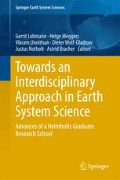Abstract
Earth System Science has developed over the last two decades from an interesting concept in Earth sciences education to a fully integrative science focussed on understanding the complex system Earth. This evolution is partially due to the radical and far reaching anthropogenic changes and the general feeling of helplessness with regards to the possible consequences and future impacts on the Earth System. This paper proposes that a paradigm shift in undergraduate and graduate education is needed to further develop Earth System Science. Graduate programs such as the Earth System Science Research School (ESSReS), which are intrinsically trans- and interdisciplinary will help to change rigid subject specific mind-set among faculty and students. The health and sustainability of our planet is at stake.
Access this chapter
Tax calculation will be finalised at checkout
Purchases are for personal use only
Notes
- 1.
Goldilocks planet may be just right for life—space—25 April 2007—New Scientist. http://www.newscientist.com/article/dn11710#.U-sd04CSwRo.
- 2.
Earth System Science. http://en.wikipedia.org/wiki/Earth_system_science.
- 3.
IPCC—Intergovernmental Panel on Climate Change. http://www.ipcc.ch/.
- 4.
Bonn climate change conference—June (2014). http://unfccc.int/meetings/bonn_jun_2014/meeting/8031.php.
- 5.
Earth System Science Courses. http://serc.carleton.edu/introgeo/earthsystem/nutshell/courses.html.
References
Berner RA (2012) Jacques-Joseph Ébelmen, the founder of Earth System Science. CR Geosci 344:544–548
Canadell J, Noble I (2001) Challenges of a changing Earth. Trends Ecol Evol 16:664–666
Dong S, Xu S, Lu X (2009) Development of online instructional resources for Earth system science education: an example of current practice from China. Comput Geosci 35:1271–1279
Downy C, Cornell S (2011) Editorial: key themes and messages from the Earth System Science 2010 conference. Procedia Environ Sci 6:3–14
Elliott SM, Hanson HP (2003) Syndication of the Earth system: the future of geoscience? Environ Sci Policy 6:457–463
Fritz J, Bitsch B, Kührt E et al (2014) Earth-like habitats in planetary systems. Planet Space Sci 98:254–267
Grosfeld K, Lohmann G, Wolf-Gladrow D et al (2013) The structural and educational concept in an interdisciplinary research school for Earth System Science
Ignaciuk A, Rice M, Bogardi J et al (2012) Responding to complex societal challenges: a decade of Earth System Science partnership (ESSP) interdisciplinary research. Curr Opin Environ Sustain 4:147–158
Ireton MFW, Manduca CA, Mogk DW (1996) Shaping the future of undergraduate Earth science education: Innovation and change using an Earth system approach. American Geophysical Union, Washington DC
Lawton J (2001) Earth System Science. Science 292:1965
Love DJ, Wilson FK, Murty KS et al (1993) An interdisciplinary Earth System Science (ESS) curriculum, community outreach, and research program. Comput Environ Urban Syst 17:73–82
Lovelock JE (1972) GAIA as seen through the atmosphere. Atmos Environ (1967) 6:579–580
Meggers H, Hanfland C, Sprengel C et al (2014) ESSReS-PeP-POLMAR, an international and interdisciplinary postgraduate education concept on earth and environmental sciences. European Geoscience Union, General Assembly, Vienna
Miall AD (1995) The blue planet: an introduction to Earth System Science. Earth Sci Rev 39:269–271
Pitman AJ (2005) On the role of geography in Earth System Science. Geoforum 36:137–148
Walker JC (1999) Earth System Science and the western worldview. Chem Geol 161:365–371
William MA, Helen J, Gaffney O (eds) (2010) Developing an integrated history and future of people on Earth (IHOPE): Research plan. IGBP Report No. 59. IGBP Secretariat, Stockholm. p 40
Winkler R-L (2014) Vladimir Ivanovich Vernadsky—an outstanding historian of science and a pioneer of the science of science. J Geochem Explor 147:65–68
Author information
Authors and Affiliations
Corresponding author
Editor information
Editors and Affiliations
Rights and permissions
Copyright information
© 2015 Springer International Publishing Switzerland
About this chapter
Cite this chapter
Unnithan, V. et al. (2015). Earth System Science—Past Experiences and Future Trends. In: Lohmann, G., Meggers, H., Unnithan, V., Wolf-Gladrow, D., Notholt, J., Bracher, A. (eds) Towards an Interdisciplinary Approach in Earth System Science. Springer Earth System Sciences. Springer, Cham. https://doi.org/10.1007/978-3-319-13865-7_1
Download citation
DOI: https://doi.org/10.1007/978-3-319-13865-7_1
Published:
Publisher Name: Springer, Cham
Print ISBN: 978-3-319-13864-0
Online ISBN: 978-3-319-13865-7
eBook Packages: Earth and Environmental ScienceEarth and Environmental Science (R0)

